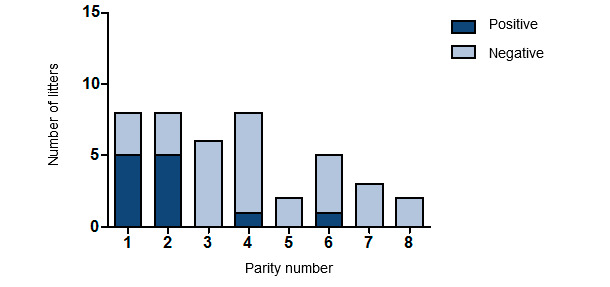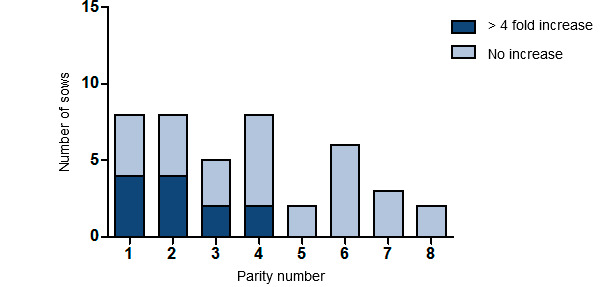Swine influenza virus (SIV) is a common pathogen in pigs and in most pig producing countries the majority of the sow herds are influenza A positive. The most common serotypes globally are H1N1, H3N2 and H1N2. Clinical signs are often manifested as acute respiratory disease with fever, anorexia, weight loss, lethargy, coughing, dyspnea, nasal, and ocular discharge. Reproductive failure and abortions can be seen in sows. Secondary infections and increased use of antibiotics are common sequelae. SIV is generally regarded as clinical important for older pigs whereas piglets are considered to be protected by maternal antibodies. There are, however, very few studies on the incidence and impact of SIV infection in piglets. In a small cross-sectional study performed in a single Danish farrow-to-finish herd known to have clinical respiratory signs due to SIV and which did not vaccinate against SIV, nasal swabs from 10-14 days old piglets were tested for SIV by RT-PCR pooled by litter. A total of 12 out of 43 tested litters (28.6%) tested positive for SIV (Figure 1).


Figure 1. Number of litters positive for SIV by RT-PCR according to parity of the sow
In contrast, SI virus was not detected in nasal swabs from any of the 43 sows tested five days after transfer to the farrowing unit. Of the 43 sows, however, 12 (27.9%) showed a significant (minimum 2-fold) increase in antibody titer against at least one of the tested SIV subtypes (Figure 2). There was no significant relationship between SIV positive litter and increased antibody titer of the mother sow. First and 2nd parity sows had significantly more SIV positive litters compared to the older sows. Accordingly, the younger sows had a statistically significant higher risk of having a minimum 2-fold increase in antibodies against SIV in relation to farrowing. Apart from coughing, there were no significant differences in the incidences of individual clinical symptoms of SIV positive and negative litters, however, when the clinical signs were scored and summed up for each litter there was a significant higher score in litters with SIV positive piglets. The average daily weight gain was not different between SIV positive and negative litters.

Figure 2. Number of sows having a > four-fold increase in antibodies against SIV according to parity number
This small scale study performed in a single herd indicated that a relatively high proportion of young piglets in a farrowing unit of a herd with circulating swine influenza virus may be infected by SIV during the first weeks after birth revealing that not all piglets are protected by maternal antibodies. Interestingly, piglets from young sows had a higher risk of being infected by SIV compared to piglets from older sows but since all the sows were negative for virus in nasal swabs and there was no correlation between antibody titer rise of a particular sow and the risk of her litter being positive, the piglets are not necessary infected by their mother-sow. Thus, the increased risk of piglets from young sows being infected by SIV may be due to sub optimal quality of the passively acquired immunity. Thus, in relation to the handling of SIV in breeding units, the focus should be on the offspring of gilts and young sows.


